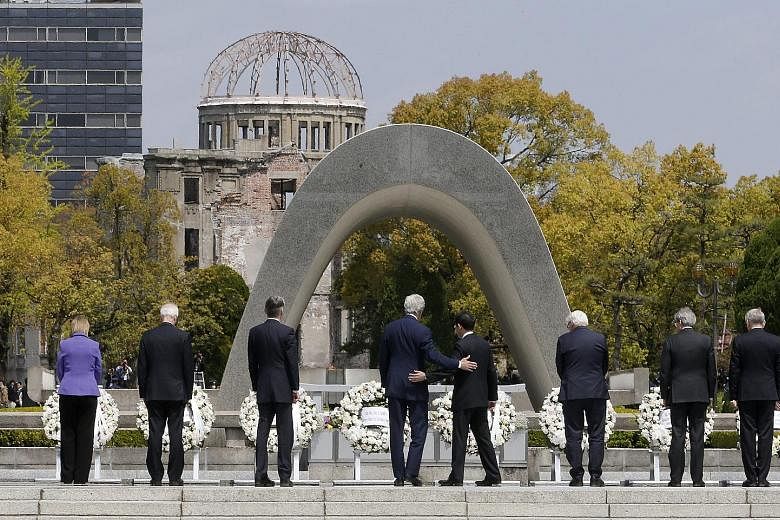HIROSHIMA • United States Secretary of State John Kerry called his visit to a memorial to victims of the 1945 US nuclear attack on Hiroshima "gut-wrenching" and said it was a reminder of the need to pursue a world free of nuclear weapons.
The first US secretary of state to visit Hiroshima, Mr Kerry said yesterday that US President Barack Obama also wanted to travel to the world's first city to suffer atomic bombing, but he did not know whether the leader's complex schedule would allow him to do so when he visits the country for a Group of Seven (G-7) summit next month.
Mr Kerry toured the Hiroshima Peace Memorial Museum, whose haunting displays include photographs of badly burnt victims, the tattered and stained clothes they wore and statues depicting them with flesh melting from their limbs.
Mr Kerry, together with the European Union foreign policy head and foreign ministers from Britain, Canada, France, Germany, Italy and Japan, laid white wreaths at a cenotaph to the victims of the Aug 6, 1945, bombing, which reduced the city to ashes and killed about 140,000 people by the end of that year.
While Mr Kerry is not the highest-ranking US official to have toured the museum and memorial park, a distinction that belongs to then US Speaker of the House of Representatives Nancy Pelosi in 2008, he is the most senior executive branch official to visit.
"Everyone in the world should see and feel the power of this memorial. It is a stark, harsh, compelling reminder not only of our obligation to end the threat of nuclear weapons, but also to rededicate all our effort to avoid war itself," the top US diplomat wrote in a guest book.
When asked later if this meant Mr Obama should come, Mr Kerry said: "Everyone means everyone. So I hope one day the President of the United States will be among the everyone who is able to come here. Whether or not he can come as president, I don't know."
A visit by Mr Obama could be controversial in America if it were viewed as an apology. A majority of Americans view the bombings as justified to end the war and save US lives, while the vast majority of Japanese believe it was not justified.
After the tour by Mr Kerry and his fellow G-7 foreign ministers, the group issued a statement reaffirming their commitment to building a world without nuclear arms, but said the push had been made more complex by North Korea's repeated "provocations" and by worsening security in Syria and Ukraine.
The G-7 foreign ministers' trip to the museum and memorial is part of Japan's effort to send a strong nuclear disarmament message.
"I think this first-ever visit by G-7 foreign ministers to the peace memorial park is a historic first step towards reviving momentum towards a world without nuclear weapons," Japanese Foreign Minister Fumio Kishida said in a statement.
He later told a news conference that it was "inconceivable" that Japan would ever decide to have nuclear weapons.
Last month, US Republican presidential candidate Donald Trump said Japan and South Korea should build such weapons to deter enemies.
REUTERS

